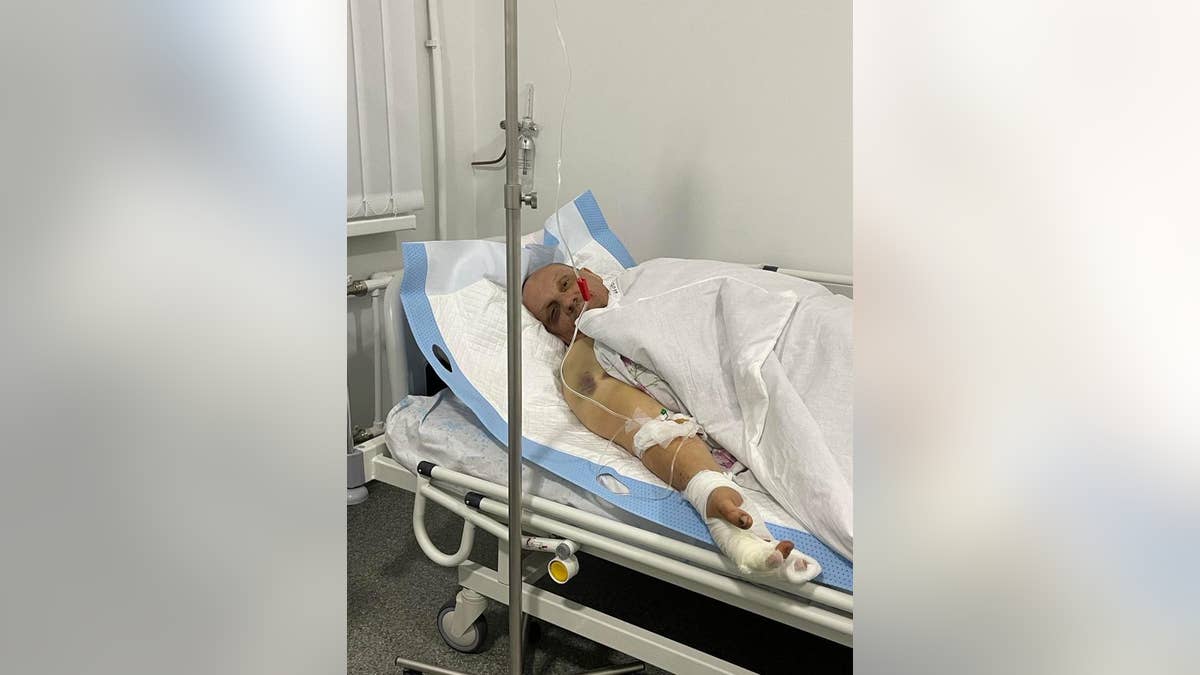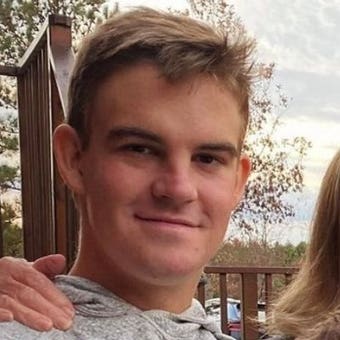WARNING: This post contains graphic images.
Oleg Moskalenko, a Ukrainian businessman and university professor from a town on the outskirts of Kyiv, was taken prisoner by Russian forces in early March, then was tortured and interrogated for a week before being set free in the middle of a forest and eventually finding his way back to safety.
Moskalenko, 53, detailed the ordeal in an interview with Fox News Digital from Warsaw, Poland, where he is currently recovering after losing multiple fingers, a third of his right foot and three toes on his left foot.

Oleg Moskalenko, 53, shortly after he was transported to a hospital in Germany. (Oleg Moskalenko)
When the war broke out Feb. 24, Moskalenko and his family initially wanted to stay in their village of Severynivka, but after his neighbor’s house was destroyed in an explosion on March 3, and as the fighting grew closer, Moskalenko knew he had to take his family to Poland, where they could be safe.
"I decided that I have to move my family, my friends out of Ukraine. We take all our things, visas, go to the Polish border," Moskalenko said. "After that, from the Polish border, I head back to my house because I would like to take some clothes, some important things, some papers."
When he returned to his home near Kyiv March 7, he was accosted by Russian soldiers.
"They were really aggressive. They took me out of the car. They put me in handcuffs," Moskalenko said.
The Russians put a bag over his head so that he could not see anything and drove him to a base they had set up.
"They put me in a hole in the ground, a pit. It was approximately two meters deep," Moskalenko said, noting that he had lost his shoes and did not have necessary clothing for the freezing temperatures.
Over the next two days, the Russians took him out of the pit every couple of hours and interrogated him while beating him with the butts of their rifles and even cutting off his fingers.
"They are screaming at me, ‘Are you nationalist?’ I say, ‘No, I am not nationalist, but I am Ukrainian. I love my country.’" Moskalenko said.
"They asked me, ‘OK, guy, you are Ukrainian soldier. You are making some research here because you would like to know exact location.’ I tell them, ‘Hey guys, I am not a military guy. I am a civilian. I am driving the car. I don’t know any secret information.’ My information, my answers – it’s nothing for them."
PUTIN PUSHES TOWARD RUSSIA, BELARUS UNIFYING AFTER NATO EXPANSION
After two days of torture in freezing temperatures, the Russians took Moskalenko out of the pit and transported him to a nearby building, where they left him in a basement with a few other Ukrainian prisoners of war. He was in that damp basement for approximately five days as the wounds on his hands started to rot and the frostbite on his feet turned black.
The Russians eventually put a bag over his head again and drove Moskalenko and another Ukrainian man roughly 40 to 60 kilometers before setting them free in the middle of a forest.
Moskalenko was barely able to walk due to the frostbite on his feet, but they found a building roughly two to three kilometers away where they were able to warm up near a stove. The other Ukrainian prisoner located a vehicle that had broken down but was able to get it running. They drove it until they found a post with Ukrainian soldiers.
Those Ukrainian soldiers immediately called an ambulance to take Moskalenko to a hospital in Fastiv. A couple of days later on March 17, he was driven to Moldova, where he was then airlifted to a hospital in Munich, Germany, to undergo extensive surgeries for his hands and feet.
HERE'S HOW AN AMERICAN VET IS WORKING TO SAVE UKRAINE'S MOST VULNERABLE
Moskalenko is now in Poland closer to his family and is undergoing more rehab. His business before the war, an online shop selling auto parts, has completely shut down.
His lifelong best friend, Dmitriy Voskoboynik, who is from Ukraine but moved to the United States in 1993, started a GoFundMe to help raise money for Moskalenko's medical bills and his family's basic needs.
Moskalenko's story is just one of countless disturbing accounts that have come out of Ukraine over the past four and a half months.
United Nations High Commissioner for Human Rights Michelle Bachelet said this week that her office has identified 270 cases of "arbitrary detention" by Russian armed forces.
"With daily killings, widespread destruction, arbitrary detention and mass displacement, civilians are bearing the brunt of hostilities that seemingly have no end in sight," Brachelete said Tuesday.
CLICK HERE TO GET THE FOX NEWS APP
Moskalenko's village of Severynivka is just 20 miles southwest of Bucha, where more than 400 civilians were found in mass graves after Russian forces pulled out of the Kyiv suburbs in early April.
Multiple international bodies, including the U.N. Human Rights Council and International Criminal Court, are investigating Russian war crimes.











































